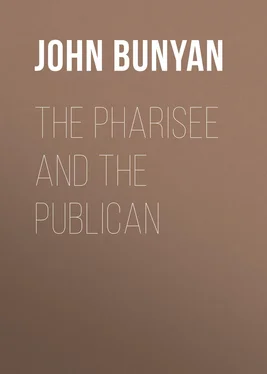John Bunyan - The Pharisee and the Publican
Здесь есть возможность читать онлайн «John Bunyan - The Pharisee and the Publican» — ознакомительный отрывок электронной книги совершенно бесплатно, а после прочтения отрывка купить полную версию. В некоторых случаях можно слушать аудио, скачать через торрент в формате fb2 и присутствует краткое содержание. Жанр: foreign_prose, foreign_religion, Философия, foreign_psychology, foreign_antique, на английском языке. Описание произведения, (предисловие) а так же отзывы посетителей доступны на портале библиотеки ЛибКат.
- Название:The Pharisee and the Publican
- Автор:
- Жанр:
- Год:неизвестен
- ISBN:нет данных
- Рейтинг книги:4 / 5. Голосов: 1
-
Избранное:Добавить в избранное
- Отзывы:
-
Ваша оценка:
- 80
- 1
- 2
- 3
- 4
- 5
The Pharisee and the Publican: краткое содержание, описание и аннотация
Предлагаем к чтению аннотацию, описание, краткое содержание или предисловие (зависит от того, что написал сам автор книги «The Pharisee and the Publican»). Если вы не нашли необходимую информацию о книге — напишите в комментариях, мы постараемся отыскать её.
The Pharisee and the Publican — читать онлайн ознакомительный отрывок
Ниже представлен текст книги, разбитый по страницам. Система сохранения места последней прочитанной страницы, позволяет с удобством читать онлайн бесплатно книгу «The Pharisee and the Publican», без необходимости каждый раз заново искать на чём Вы остановились. Поставьте закладку, и сможете в любой момент перейти на страницу, на которой закончили чтение.
Интервал:
Закладка:
2. Here is a promise made to this man, that he shall surely live; but on this condition, that he trust not to his own righteousness. Whence it is manifest, that the promise of life to this righteous man, is not for the sake of his righteousness, but for the sake of something else; to wit, the righteousness of Christ.
1. Not for the sake of his own righteousness. This is evident, because we are permitted, yea, commanded, to trust in the righteousness that saveth us. The righteousness of God is unto us all, and upon all that believe; that is, trust in it, and trust to it for justification. Now therefore, if thy righteousness, when most perfect, could save thee, thou mightst, yea oughtst, most boldly to trust therein. But since thou art forbidden to trust to it, it is evident it cannot save; nor is it for the sake of that, that the righteous man is saved; Rom. iii. 21, 22.
2. But for the sake of something else, to wit, for the sake of the righteousness of Christ, “Whom God hath set forth to be a propitiation through faith in his blood, to declare his righteousness for the remission of sins that are past, through the forbearance of God; to declare, I say, at this time his righteousness, that he might be just, and the justifier of him that believeth in Jesus;” Rom. iii. 25, 26; see Phil. iii. 6–8.
“If he trust to his own righteousness, and commit iniquity, all his righteousness shall not be remembered; but for his iniquity that he hath committed (in trusting to his own righteousness), he shall die for it.”
Note hence further.
1. That there is more virtue in one sin to destroy, than in all thy righteousness to save thee alive. If he trust, if he trust ever so little, if he do at all trust to his own righteousness, all his righteousness shall be forgotten; and by, and for, and in, the sin that he hath committed, in trusting to it, he shall die.
2. Take notice also, that there are more damnable sins than those that are against the moral law. By which of the ten commandments is trusting to our own righteousness forbidden? Yet it is a sin: it is a sin therefore forbidden by the gospel, and is included, lurketh close in, yea, is the very root of, unbelief itself; “He that believes not shall be damned.” But he that trusteth in his own righteousness doth not believe, neither in the truth, nor sufficiency of the righteousness of Christ to save him, therefore he shall be damned.
But how is it manifest, that he that trusteth to his own righteousness, doth it through a doubt, or unbelief of the truth or sufficiency of the righteousness of Christ?
I answer, because he trusteth to his own. A man will never willingly choose to trust to the worst of helps, when he believes there is a better as near, and to be had as soon, and that too, upon as easy, if not more easy terms. If he that trusteth to his own righteousness for life, did believe that there is indeed such a thing as the righteousness of Christ to justify, and that this righteousness of Christ has in it all-sufficiency to do that blessed work, be sure he would choose that, thereon to lay, lean, and venture his soul, that he saw was the best, and most sufficient to save; especially when he saw also (and see that he must, when he sees the righteousness of Christ), to wit, that that is to be obtained as soon, because as near, and to be had on as easy terms: nay, upon easier than man’s own righteousness. I say, he would sooner choose it, because of the weight of salvation, of the worth of salvation, and of the fearful sorrow that to eternity will overtake him that in this thing shall miscarry. It is for heaven, it is to escape hell, wrath, and damnation, saith the soul; and therefore I will, I must, I dare not but choose that, and that only, that I believe to be the best and most sufficient help in so great a concern as soul-concern is. So then he that trusteth to his own righteousness, does it of unbelief of the sufficiency of the righteousness of Christ to save him.
Wherefore this sin of trusting to his own righteousness is a most high transgression; because it contemneth the righteousness of Christ, which is the only righteousness that is sufficient to save from the curse of the law. It also disalloweth the design of heaven, and the excellency of the mystery of the wisdom of God, in designing this way of salvation for man. What shall I say, It also seeketh to rob God of the honour of the salvation of man. It seeketh to take the crown from the head of Christ, and to set it upon the hypocrite’s head; therefore, no marvel that this one sin be of that weight, virtue, and power, as to sink that man and his righteousness into hell, that leaneth thereon, or trusteth unto it.
But, Pharisee, I need not talk thus unto thee; for thou art not the man that hath that righteousness that God findeth not fault withal; nor is it to be found, but with him that is ordained to be the Saviour of mankind; nor is there any such one besides Jesus, who is called Christ. What madness then has brought thee into the temple, there in an audacious manner to stand and vaunt before God, saying, “God, I thank thee, I am not as other men are?”
Dost thou not know, that he that breaks one, breaks all the commandments of God; and consequently, that he that keeps not all, keeps none at all of the commandments of God? Saith not the scripture the same? “For whosoever shall keep the whole law, and yet offend in one point, he is guilty of all;” Jam. ii. 10. Be confounded then, be confounded.
Dost thou know the God with whom now thou hast to do? He is a God that cannot (as he is just) accept of an half righteousness for a whole; of a lame righteousness for a sound; of a sick righteousness for a well and healthy one; Mal. i. 7, 8. And if so, how should he then accept of that which is no righteousness? I say, how should he accept of that which is none at all, for thine is only such? And if Christ said, “When you have done all, say, We are unprofitable,” how camest thou to say, before thou hadst done one thing well, I am better, more righteous than other men?
Didst thou believe, when thou saidst it, that God knew thy heart? Hadst thou said this to the Publican, it had been a high and rampant expression; but to say this before God, to the face of God, when he knew that thou wert vile, and a sinner from the womb, and from the conception, spoils all. It was spoken to put a check to thy arrogancy when Christ said, “Ye are they that justify yourselves before men; but God knoweth your hearts;” Luke xvi. 15.
Hast thou taken notice of this, that God judgeth the fruit by the heart from whence it comes? “A good man, out of the good treasure of his heart, bringeth forth that which is good; and an evil man, out of the evil treasure of his heart, bringeth forth that which is evil;” Luke vi. 45. Nor can it be otherwise concluded, but that thou art an evil man, and so that all thy supposed good is nought but badness; for that thou hast made it to stand in the room of Jesus, and hast dared to commend thyself to the living God thereby: for thou hast trusted in thy shadow of righteousness, and committed iniquity. Thy sin hath melted away thy righteousness, and turned it to nothing but dross; or, if you will, to the early dew, like to which it goeth away, and so can by no means do thee good, when thou shalt stand in need of salvation and eternal life of God.
But, further, thou sayst thou art righteous; but they are but vain words. Knowest thou not that thy zeal, which is the life of thy righteousness, is preposterous in many things? What else means thy madness, and the rage thereof, against men as good as thyself. True, thy being ignorant that they are good, may save thee from the commission of the sin that is unpardonable; but it will never keep thee from spot in God’s sight, but will make both thee and thy righteousness culpable.
Paul, who was once as brave a Pharisee as thou canst be, calleth much of that zeal which he in that estate was possessed with, and lived in the exercise of, madness; yea, exceeding madness (Acts xxvi. 9–11; Phil, iii. 5, 6); and of the same sort is much of thine, and it must be so; for a lawyer, a man for the law, and that resteth in it, must be a persecutor; yea, a persecutor of righteous men, and that of zeal to God; because by the law is begotten, through the weakness that it meeteth with in thee, sourness, bitterness of spirit, and anger against him that rightfully condemneth thee of folly, for choosing to trust to thy own righteousness when a better is provided of God to save us; Gal. iv. 28–31. Thy righteousness therefore is deficient; yea, thy zeal for the law, and the men of the law, has joined madness with thy moral virtues, and made thy righteousness unrighteousness: how then canst thou be upright before the Lord?
Читать дальшеИнтервал:
Закладка:
Похожие книги на «The Pharisee and the Publican»
Представляем Вашему вниманию похожие книги на «The Pharisee and the Publican» списком для выбора. Мы отобрали схожую по названию и смыслу литературу в надежде предоставить читателям больше вариантов отыскать новые, интересные, ещё непрочитанные произведения.
Обсуждение, отзывы о книге «The Pharisee and the Publican» и просто собственные мнения читателей. Оставьте ваши комментарии, напишите, что Вы думаете о произведении, его смысле или главных героях. Укажите что конкретно понравилось, а что нет, и почему Вы так считаете.












